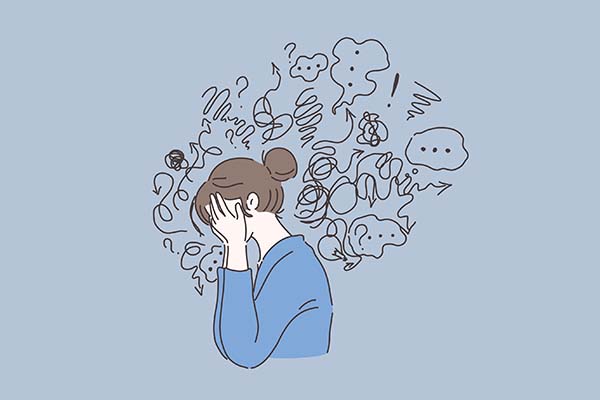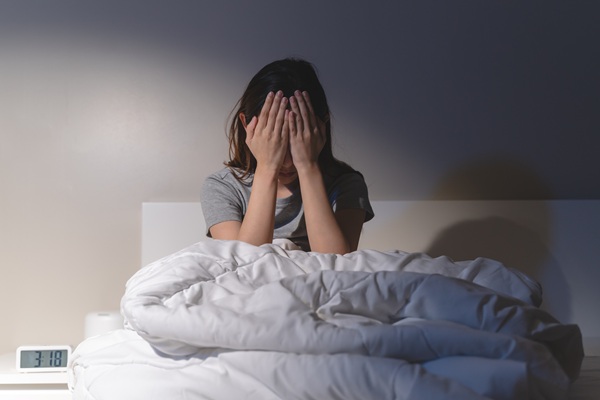Anxiety Disorder: What Are the Symptoms?

If you are experiencing symptoms of an anxiety disorder, then you should consult with a psychiatrist for an accurate diagnosis and to learn more about treatment options that are available to you. This review offers an in-depth look at the most notable and common symptoms that are associated with an anxiety disorder. The hope is to provide you with more information to determine if you or your loved one should consider a visit to a mental health professional for a more detailed evaluation and treatment recommendation.
The symptoms of anxiety disorder
Anyone who experiences severe nervousness, hyperventilation, a sense of danger or panic, sweating, trembling, or difficulty sleeping as a result of potential anxiety triggers may have an anxiety disorder. The following is a closer look at each symptom and specifically how it relates to anxiety.
Severe nervousness
A common symptom of patients who are diagnosed with an anxiety disorder is nervousness. Many feel as if they are tense and restless in anticipation of an event. Often, the nervousness is irrational, and many patients even realize the nervousness or fear is irrational but are not able to control it. This may affect the patient’s ability to function properly each day and be at their best in school, work, and in social situations.
Hyperventilation
Hyperventilation is a term used to describe rapid uncontrolled breathing, which is typically the result of severe anxiety or stress. This is a common symptom among patients who are diagnosed with anxiety disorder, especially while they are experiencing an anxiety attack. Hyperventilation can become dangerous to long-term health, and it is important to seek treatment if it occurs frequently.
A sense of danger or panic
Many with an anxiety disorder experience a sense of danger or panic, even in moments when the perceived risk is not great. If an irrational fear of danger or panic attack occurs, then visiting a psychiatrist to discuss the symptoms and determine the root cause for them is essential.
Sweating and trembling
Sweating and trembling are often associated with severe stress and anxiety. While everyone deals with stress from time to time, if severe stress becomes chronic and symptoms such as sweating hands and feet and trembling of the arms and legs occur as a result of the anxiety, then it is a sign of an anxiety disorder.
Difficulty sleeping
A lack of sleep can make anxiety worse. On the other hand, an anxiety disorder can also make sleep more challenging. Many with anxiety disorders find themselves lying in bed unable to fall asleep due to anxious feelings and thoughts. If this occurs, then it is time to see a psychiatrist for a diagnosis.
Avoiding potential triggers
Anxiety disorders can lead to avoiding possible triggers altogether. For example, individuals with a social anxiety disorder may shy away from situations where there are large gatherings. Part of anxiety disorder treatment involves dealing with these potential triggers head-on and overcoming them.
Anxiety disorder treatment options
It is important to discuss your symptoms and overall condition with a mental health professional before beginning any treatment plan. There are a range of anxiety disorder treatment options. The most notable and common types of anxiety disorder treatments include:
- Psychotherapy
- Selective serotonin reuptake inhibitors (SSRIs)
- Other antidepressant medications
- Other anti-anxiety medications
Many mental health professionals recommend a combination of psychotherapy (e.g. cognitive behavioral therapy) and medications. Some patients only require psychotherapy to address their anxiety disorder. In other cases, some patients reduce their need for psychotherapy over time while continuing to take their medication.
The benefits of anxiety disorder treatment from a mental health professional
The good news is many patients are able to find relief from anxiety disorder symptoms through a proper treatment plan from a licensed mental health professional. The benefits of professional treatment include being able to:
- Improve mind and body function
- Develop better coping skills
- Improve important relationships
- Improve performance at school/work
- Increase confidence during stressful situations
The benefits are especially notable when the individual is in a stressful life situation, such as giving an important speech at work or school or dealing with the illness or death of a loved one. The type of treatment often dictates the benefits (e.g. CBT therapy, medication, etc.)
Our team helps patients with anxiety disorders
Call our team today to learn more about anxiety disorders. We can arrange a time for you to visit with us for a consultation, during which we can discuss your symptoms and treatment goals to help you overcome your symptoms in the short term as well as long term.
Get more information here: https://www.hopetmsofny.com or call Hope TMS and Neuropsychiatric Center at (646) 578-8152
Check out what others are saying about our services on Yelp: Anxiety Disorder in New York, NY.
Recent Posts
Insomnia disrupts sleep patterns and negatively affects overall health, leading to fatigue, difficulty concentrating, and emotional distress. This condition can result from chronic stress, anxiety, depression, or medical issues that interfere with the body's natural sleep cycle. A psychiatrist can help diagnose and address insomnia, providing tailored treatments focusing on mental and physical well-being.Insomnia is…
Relationship obsessive-compulsive disorder (ROCD) is a distinct subtype of OCD that can cause persistent doubts and distressing thoughts about romantic relationships. OCD treatment can help individuals manage their intrusive thoughts and compulsive behaviors associated with ROCD. Understanding and having access to the available treatment options can help individuals regain control over their thoughts and the…
Smoking cessation is one of the best things a person can do for their health. Still, despite the ill health effects of smoking and the clear benefits of quitting, many people find it nearly impossible to quit on their own. If you are finding it hard to quit, gain insight into why you may be…
Transcranial magnetic stimulation (TMS) is a cutting-edge treatment that offers hope for people dealing with depression and anxiety, especially those who have not found relief with medication or therapy. TMS is a non-invasive procedure that uses magnetic fields to stimulate specific areas of the brain involved in mood regulation. This innovative approach is helping many…


